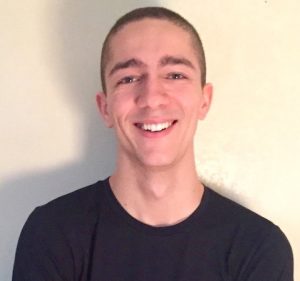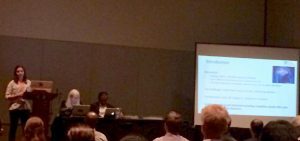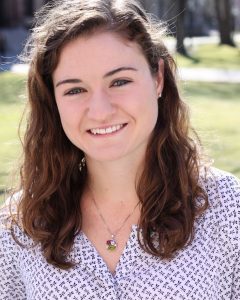NEWS
Meet the Vitale Lab at BMES 2019
We are getting ready for BMES 2019, which this year will be hosted here in Philadelphia. This year there will be a great representation from the Vitale lab, with 3 oral and 2 poster presentations.
Here the details of our presentations:
- Thursday Oct. 17, 2.15p. Room 120C Nicolette Driscoll will present her talk: “Ti3C2 MXene for Dry EEG Electrodes” (Authors: N. Driscoll, B. Erickson, B. Murphy, N. Apollo, J. Medaglia, F. Vitale)
- Friday Oct. 18, Room 115C Teddy Wang will present his talk: “Flexible, Transparent micro-LED Arrays for Optogenetic Stimulation of Living Electrodes”, (Authors: T. Wang, N. Driscoll, O. Adewole, M. Serruya, K. Cullen, F. Vitale.)
- Friday Oct. 18 Matthew Zwimpfer and Kayla Prezelski will present their poster: “MINT: A Multipoint INjection Technology For Intracerebral Gene Transfer” (Authors: M. Zwimpfer, K. Prezelski, M. Kaiser, T. Lucas, P. Gonzalez-Alegre, F. Vitale)
- Saturday Oct. 19, 8.15a Room 120C Brendan Murphy will present his talk: “A Ti3C2 MXene-Based Array For High-Density Surface Electromyography “ (Authors: B. Murphy, N. Driscoll, N. Apollo, A. Richardson, P. Mulcahey, G. Robbins, T. Dillingham, F. Vitale)
- Saturday Oct. 19 Gary Eberly will present her poster: “Transparent MXene MicroECoG Electrodes For Multi-Modal Seizure Monitoring”. (Authors: G. Eberly, N. Driscoll, B. Murphy, F. Vitale. )
Come and meet us at BMES!
Dr. Vitale receives the K12 Career Development Award
Dr. Vitale has received the Interdisciplinary Rehabilitation Engineering Career Development Award (IREK12). This award will support her on wearable EMG sensors to study fundamental mechanisms involved in neuromuscular disorders and support targeted rehabilitation strategies.
The Interdisciplinary Rehabilitation Engineering Research Career Development Program (IREK12) in Movement and Rehabilitation Sciences (MRS) recruits and trains scholars with engineering and other quantitative backgrounds to become successful rehabilitation scientists in basic, translational and/or clinical research. To read more about the program: https://irek12.org
Welcome summer students!
We are very excited to welcome to the 6 new students who will be joining the Vitale Lab team for the summer.
Placid Unegbu has just completed his Master’s degree in Bioengineering at Penn and will be working on closed-loop control of electrodes for neural recording and optogentic stimulation. Gari Eberly (rising junior in Biomedical Engineering Bucknell University) and Tessa Posey (rising senior in Bimedical Engineering at the University of South Carolina) from the Singh Center REU program, Nancy Rodriguez-Perez (rising junior in Civil Engineering at ASU) from the REU SUNFEST Program, and Quincy Hendricks (rising sophomore in Bioengineering at Penn) will be working on microfabrication and characterization of our neural electrodes. Campbell Parker (rising junior in in Bioengineering at Penn) will be working on optimizing our film casting setup.
This will be a busy and super productive summer in the Vitale Lab!
Our paper on MXene neuroelectronics is accepted in ACS Nano!
Nicki’s paper on high-resolution neural electrodes based on MXene has been accepted for publication in ACS Nano. The paper describes the first example of neural interfaces from MXene, a 2D nanomaterial recently discovered by Prof. Gogotsi and his team at Drexel. Specifically, we show a novel microfabrication process to fabricate neural recording electrodes from MXene and we extensively characterize them in vitro and in vivo. Compared to conventional electrode materials, like metals, MXene neural electrodes have significant less impedance which translates in higher signal-to-noise ratio. Furthermore, they can detect neural spiking activity that is “invisible” on the higher impedance electrodes. In the paper, we also show that our MXene-based devices are flexible, that they can easily conform to the curved surface of the brain, and that are compatible to neuronal growth and proliferation in vitro.
Congratulations Nicki!
To read more: https://pubs.acs.org/doi/10.1021/acsnano.8b06014
Dr. Flavia Vitale awarded McCabe Fellow Award
Dr. Flavia Vitale has been awarded the McCabe Fellow Award on July 13, 2018.The McCabe awards were established in 1969 by a generous gift from Mr. Thomas B. McCabe and Mrs. Jeannette E. Laws McCabe to the Perelman School of Medicine (PSOM). The purpose of this gift is to support junior faculty who initiate fresh and innovative biomedical and surgical research projects.
For more information: http://www.med.upenn.edu/evdresearch/mccabefundawardprogram.html
Dr. Flavia Vitale appointment to Assistant Professor
 Dr. Flavia Vitale has been appointed as Assistant Professor within the Department of Neurology and the Department of Physical Medicine and Rehabilitation (PMR) at The University of Pennsylvania.
Dr. Flavia Vitale has been appointed as Assistant Professor within the Department of Neurology and the Department of Physical Medicine and Rehabilitation (PMR) at The University of Pennsylvania.
Nick Apollo, PhD joins the CNT
 Dr. Nick Apollo is the newest addition to the CNT working alongside Drs. Flavia Vitale and Brian Litt after being awarded a trainee position in the Neuroengineering and Medicine T32 Training Grant. He is working to develop conformable biosensors capable of simultaneously monitoring neurotransmitter concentration and electrophysiological activity in real time. He will also investigate the use of 2D titanium carbide nanomaterials in neural interfacing and biosensing.
Dr. Nick Apollo is the newest addition to the CNT working alongside Drs. Flavia Vitale and Brian Litt after being awarded a trainee position in the Neuroengineering and Medicine T32 Training Grant. He is working to develop conformable biosensors capable of simultaneously monitoring neurotransmitter concentration and electrophysiological activity in real time. He will also investigate the use of 2D titanium carbide nanomaterials in neural interfacing and biosensing.
He has training in biomedical engineering (BSE ’11, University of Pittsburgh) and materials science (PhD ’17, University of Melbourne). Prior to beginning postdoctoral training at the University of Pennsylvania, he was working as a fabrication scientist at the University of Melbourne in Australia focused on building carbon-based medical devices. His research interests include carbon materials (graphene, diamond, and carbon nanotubes), brain-machine interfacing, medical device integration and packaging, and biosensing.
Brendan Murphy awarded 2018 National Science Foundation Graduate Research Fellowship
 Bioengineering PhD student Brendan Murphy has been awarded a 2018 National Science Foundation (NSF) Graduate Research Fellowship Program (GRFP) Fellowship. The GRFP promotes vitality and diversity in the scientific and engineering workforce by recognizing and supporting outstanding graduate students who are pursuing research-based master’s and doctoral degrees.
Bioengineering PhD student Brendan Murphy has been awarded a 2018 National Science Foundation (NSF) Graduate Research Fellowship Program (GRFP) Fellowship. The GRFP promotes vitality and diversity in the scientific and engineering workforce by recognizing and supporting outstanding graduate students who are pursuing research-based master’s and doctoral degrees.
Nicki Driscoll – Fall 2017 presentations
Nicolette Driscoll (Nicki) gave 2 talks in the fall of 2017.
She presented “Transparent graphene electrodes for chronic in vivo optical and electrophysiological recording” at the 2017 Biomedical Engineering Society Conference in Phoenix, October 2017 (featured in accompanying photo).
Nicki’s work on “2D Ti3C2 MXenes for high-resolution neural interfaces” was selected for oral presentation at the Symposium on Materials Design for Neural Interfaces, 2017 Materials Research Society Meeting in Boston, November 2017.
Nicki wins the best oral presentation at the Penn BE Graduate Student Research Symposium
Nicki Driscoll has been awarded best oral presentation at Penn’s 2018 Bioengineering Graduate Research Symposium for her talk titled “2D Ti3C2 MXene for High-Resolution Neural Interfaces”. Congratulations Nicki!
Dr. Flavia Vitale awarded the CURE Taking Flight Award
Dr. Flavia Vitale has developed a new class of very small, flexible electrodes that can be independently controlled after they are implanted, allowing surgeons to safely map epileptic networks in the brain with high precision. With support from CURE, Dr. Vitale will build these new devices and test them in animal models of focal epilepsy, to detect and map seizure generation and spread. If successful, this exciting new technology could precisely localize seizure networks, and allow clinicians to focally ablate or suppress them with unprecedented accuracy, exactly where they are generated.
Nicki Driscoll awarded 2017 National Science Foundation Graduate Research Fellowship
 Bioengineering PhD student Nicki Driscoll has been awarded a 2017 National Science Foundation (NSF) Graduate Research Fellowship Program (GRFP) Fellowship. The GRFP Fellowship recognizes and supports outstanding graduate students in NSF-supported science, technology, engineering, and mathematics disciplines who are pursuing research-based Master’s and doctoral degrees.
Bioengineering PhD student Nicki Driscoll has been awarded a 2017 National Science Foundation (NSF) Graduate Research Fellowship Program (GRFP) Fellowship. The GRFP Fellowship recognizes and supports outstanding graduate students in NSF-supported science, technology, engineering, and mathematics disciplines who are pursuing research-based Master’s and doctoral degrees.
